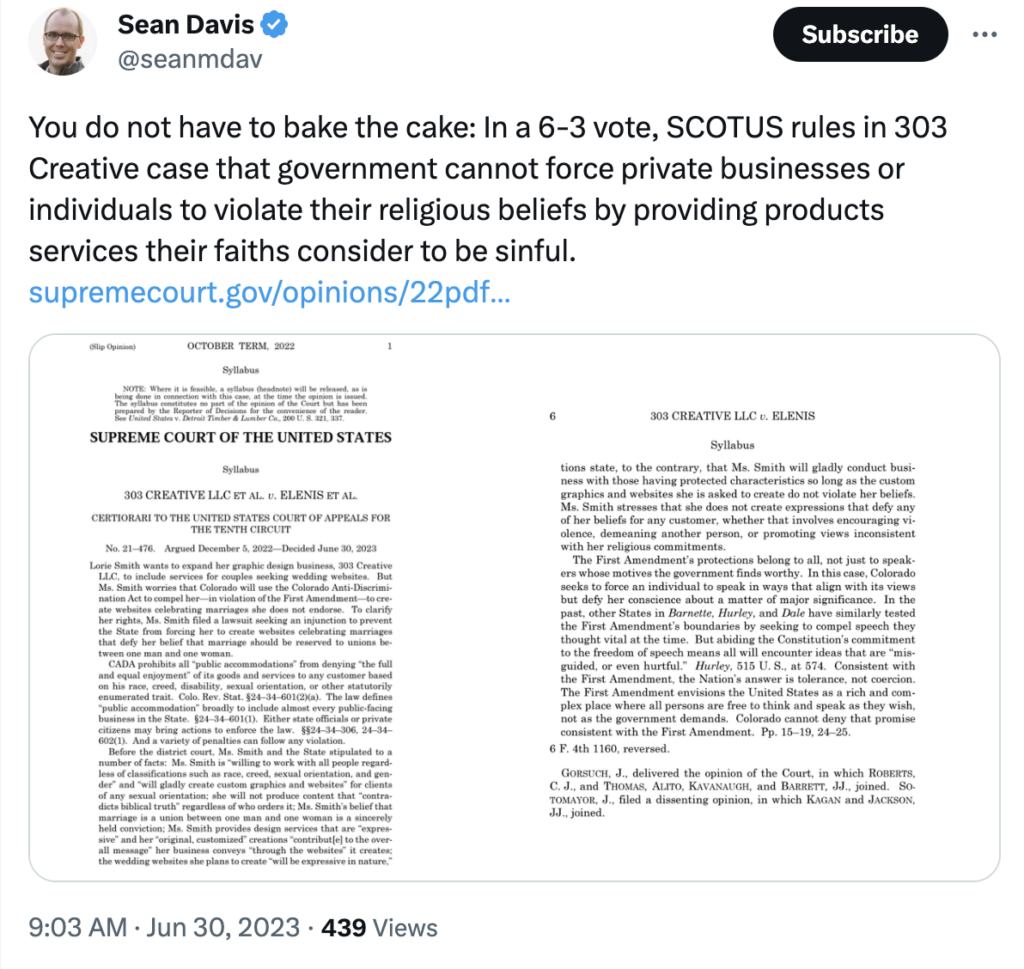In Landmark Free Speech Decision, Supreme Court Rules Government Can’t Force Americans Like Lorie Smith To Violate Religious Beliefs
The government can’t force Americans like Colorado graphic artist Lorie Smith to affirm beliefs she does not hold, the Supreme Court ruled in a landmark 6-3 decision on Friday.
“The First Amendment’s protections belong to all, not just to speakers whose motives the government finds worthy,” the ruling states.

Activists have tried for years to weaponize Colorado’s sweeping “antidiscrimination” laws to punish people like Smith and Masterpiece Cakeshop cake artist Jack Phillips for wrongthink.
Justice Neil Gorsuch, however, affirmed in the court’s majority opinion that the government can’t force Smith to make wedding websites celebrating same-sex couples because it would violate her constitutional right to exercise her Christian belief that marriage is between a man and a woman.
“The First Amendment envisions the United States as a rich and complex place where all persons are free to think and speak as they wish, not as the government demands. Because Colorado seeks to deny that promise, the judgment is reversed,” Gorsuch wrote.
The Supreme Court ruled in 2018 that Colorado commissioners displayed “a clear and impermissible hostility toward [Phillips’] sincere religious beliefs” but the decision was light-handed. In fact, a fresh onslaught of activist-led lawsuits proves that the ruling was utterly useless not just for the religious liberty and free speech rights of Americans who believe in biblical marriage but also for the cakeshop owner himself.
Just as with Phillips, Smith did not deny members of her community websites because of who they are attracted to. Instead, the Christian simply rejects the idea that the government should compel her to affirm beliefs completely antithetical to her own with a form of speech — her websites.
The state of Colorado tried to do exactly that with an “anti-discrimination” act that barred Smith from publicly implying in a posted message that she will not execute customers’ requests that violate her sincerely-held moral objections.
Despite acknowledging that Smith was “willing to work with all people regardless of sexual orientation,” the U.S. Court of Appeals for the 10th Circuit ruled against the artist in July 2021. Chief Judge Timothy Tymkovich, who penned a dissent to the decision, emphasized that the Constitution “neither forces Ms. Smith to compromise her beliefs nor condones the government doing so.”
“In fact, this case illustrates exactly why we have a First Amendment,” he added.
By February 2022, the Supreme Court accepted Smith’s appeal, which is backed by dozens of states, legislators, and organizations that view this as a landmark free speech case.
Justice Sonia Sotomayor claimed during arguments in December 2022 that ruling in Smith’s favor would be “the first time in the court’s history” that a business would be allowed to “refuse to serve a customer based on race, sex, religion or sexual orientation.”
Sotomayor and her fellow dissenters, Justices Elena Kagan and Ketanji Brown Jackson, doubled down on this narrative in their portion of the decision.
“The unattractive lesson of the majority opinion is this: What’s mine is mine, and what’s yours is yours. The lesson of the history of public accommodations laws is altogether different. It is that in a free and democratic society, there can be no social castes. And for that to be true, it must be true in the public market,” Sotomayor wrote.
As my colleague David Harsanyi noted, Sotomayor’s claim that the court’s decision “grants
a business open to the public a constitutional right to refuse to serve members of a protected class” is “the lie at the heart of the debate.”
Gorsuch also addressed the lie, which falsely conflates the rights of business owners to refuse certain services with refusing certain people, at the conclusion of the opinion.
“But, as this Court has long held, the opportunity to think for ourselves and to express those thoughts freely is among our most cherished liberties and part of what keeps our Republic strong,” Gorsuch retorted. “Of course, abiding the Constitution’s commitment to the freedom of speech means all of us will encounter ideas we consider ‘unattractive,’ ‘misguided, or even hurtful.’ But tolerance, not coercion, is our Nation’s answer.”
As Erin Hawley, senior counsel at Alliance Defending Freedom, which represented 303 Creative, confirmed, “No one is arguing — and the Alliance Defending Freedom would oppose any argument — to allow conduct that rejects an entire class of people.”
“But when the government targets speech, rather than conduct, the First Amendment’s protections apply,” she clarified.
Alliance Defending Freedom celebrated the decision as “a win for all Americans.”
“The ruling makes clear that nondiscrimination laws remain firmly in place, and that the government has never needed to compel speech to ensure access to goods and services. This is a win for all Americans,” Alliance Defending Freedom CEO, President, and General Counsel Kristen Waggoner said in a statement. “The government should no more censor Lorie for speaking consistent with her beliefs about marriage than it should punish an LGBT graphic designer for declining to criticize same-sex marriage. If we desire freedom for ourselves, we must defend it for others.”
Jordan Boyd is a staff writer at The Federalist and co-producer of The Federalist Radio Hour. Her work has also been featured in The Daily Wire, Fox News, and RealClearPolitics. Jordan graduated from Baylor University where she majored in political science and minored in journalism. Follow her on Twitter @jordanboydtx.





Comments are closed.